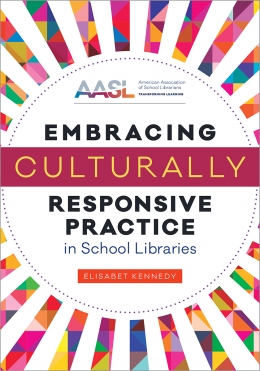Primary tabs
You don't need to be an ALA Member to purchase from the ALA Store, but you'll be asked to create an online account/profile during checkout to proceed. This Web Account is for both Members and non-Members. Note that your ALA Member discount will be applied at the final step of the checkout process.
If you are Tax-Exempt, please verify that your account is currently set up as exempt before placing your order, as our new fulfillment center will need current documentation. Learn how to verify here.
- Description
- Table of Contents
- About the author
- Reviews
For district bulk purchases, State Affiliate events, LIS students, and other special purchasing arrangements, please contact us at editionsmarketing@ala.org.
Listen to a podcast with the author now!
School librarians have always connected learners’ life experiences, cultures, and communities to materials, projects, and processes. As schools look to make these connections within the classroom and to the curriculum, school librarians are perfectly poised to lead and model meaningful steps toward a culturally responsive mindset. Embracing Culturally Responsive Practice in School Libraries celebrates how learners’ cultures shape everything from their communication to how they process information. This book translates complex concepts into accessible and practical school library strategies while challenging readers to embrace and nurture their personal and professional growth. An authentic and approachable guide to culturally responsive pedagogy aligned with the National School Library Standards, this book features
- an adapted framework with actionable steps and activities based on culturally responsive principles that directly relate to AASL Standards;
- scenarios offering context for learning, demonstrating conflicts, exploring potential harm, and suggesting strategies; and
- reflective exercises and challenges, introductory definitions, and resources for deeper exploration.
Introduction
Part 1: School Librarian
Chapter1: Looking Inward
Chapter 2: Mindful Modeling
Part 2: School Library
Chapter 3: Working with What You Have
Chapter 4: Step into the Library
Chapter 5: Thriving Partnerships
Part 3: Learner
Chapter 6: Active Participants
Chapter 7: Scenarios
Part 4: Evaluation
Chapter 8: School Librarian Evaluation
Chapter 9: Learner Evaluation
Conclusion
Appendixes
- Appendix A: Worksheets
- Worksheet A.1: Social Identity Garden Worksheet
- Worksheet A.2: Personal Identity Garden Worksheet
- Worksheet A.3: KWWHL Chart Worksheet
Work Cited
Index
Elisabet Kennedy
Elisabet Kennedy works as a school librarian at a high school in New Jersey. She graduated with a Bachelor of Arts in English and Journalism Media Studies from Rutgers University, went on to earn her Master in Library Information Science from San Jose State University, and most recently earned a Master of Arts in Education from Marshall University. She values continuous professional growth through studying and implementing inclusion and representation initiatives in school libraries, understanding and improving user experience, and learning from antiracist/antibias practitioners. She is a proud Latina, homebody, thyroid cancer survivor, pop culture fangirl, and local cuisine enthusiast.
Have you read this book? Leave a review!
"Kennedy’s book serves as a guide to applying pedagogical principles to school library strategies that promote literacy, increase access, and practice inclusive and equitable practices with a culturally proficient mindset ... [It is] thoughtful and practical."
— Booklist
"The journey to true culturally reflective practice requires inward reflection. Kennedy looks at how to challenge the existing norms through a series of scenarios which provide helpful strategies to do this. Simple things such as reflecting on the language of signage, recognizing privilege and the dominant norm in things such as collection development and resource promotion are usefully covered ... At a time when the voices of school librarians in the US are being silenced and the tone of school library spaces is being challenged from external non-library voices, this book reflects what school libraries aim to achieve for vulnerable students. It is a useful and practical contribution, providing tools for library teams to promote inclusive spaces for all users."
— Journal of the Australian Library and Information Association



